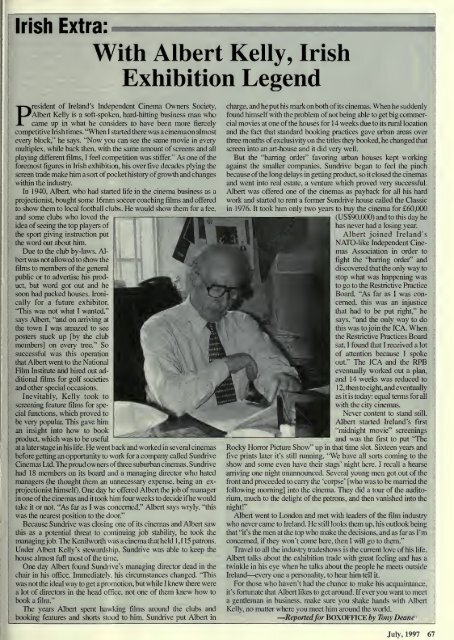Create successful ePaper yourself
Turn your PDF publications into a flip-book with our unique Google optimized e-Paper software.
Irish Extra:<br />
With Albert Kelly, Irish<br />
Exhibition Legend<br />
President<br />
of Ireland's<br />
Independent Cineina Owners Society,<br />
Albert Kelly is<br />
came up in what he considers to have been more fiercely<br />
a soft-spoken, hard-hitting business man who<br />
competitive Irish times. "When I started there was a cinema on almost<br />
every block," he says. "Now you can see the same movie in every<br />
multiplex, while back then, with the same amount of screens and all<br />
playing different films, I feel competition was stiffer" As one of the<br />
foremost figures in Irish exhibition, his over five decades plying the<br />
screen trade make him a sort of pocket history of growth and changes<br />
within the industry.<br />
In 1940, Albert, who had started life in the cinema business as a<br />
projectionist, bought some 16mm soccer coaching films and offered<br />
to show them to local football clubs. He would show them for a fee,<br />
and some clubs who loved the<br />
idea of seeing the top players of<br />
the S[X)rt giving instruction put<br />
the word out about him.<br />
Due to the club by-laws, Albert<br />
was not allowed to show the<br />
films to members of the general<br />
public or to advertise his product,<br />
but word got out and he<br />
soon had packed houses. Ironically<br />
for a future exhibitor,<br />
"This was not what I wanted,"<br />
says Albert, "and on arriving at<br />
the town I was amazed to see<br />
posters stuck up [by the club<br />
members] on every tree." So<br />
successful was this operation<br />
that Albert went to the Nation;il<br />
Film Institute and hired out additional<br />
films for golf societies<br />
and other special occasions.<br />
Inevitably, Kelly took to<br />
;<br />
cial ftinctions, which proved to<br />
[be very popular. This gave him<br />
an insight into how to book<br />
product, which was to be useful<br />
screening feature films for spe-<br />
at a later stage in his Life. He went back and worked in several cinemas<br />
before getting an opportunity to work for a company called Sundrive<br />
Cinemas Ltd. The proud owners of three suburban cinemas, Sundrive<br />
had 18 members on its board and a managing director who hated<br />
managers (he thought them an unnecessary e.xjjense, being an exjTOJectionist<br />
himself). One day he offered Albert the job of manager<br />
in one of the cinemas and it took him four weeks to decide ifhe would<br />
take it or not. "As far as I was concerned," Albert says wryly, "this<br />
was the nearest position to the door."<br />
Because Sundrive was closing one of its cinemas and Albert saw<br />
this as a potential threat to continuing job stability, he took the<br />
managing job. The Kenilworth was a cinema that held 1 , 1 1 5 patrons.<br />
Under Albert Kelly's stewardship, Sundrive was able to keep the<br />
house almost full most of the time.<br />
One day Albert found Sundrive's managing director dead in the<br />
chair in his office, hiunediately, his circumstances changed. "This<br />
was not the ideal way to get a promotion, but while I knew there were<br />
a lot of directors in the head office, not one of them knew how to<br />
book a film."<br />
The years Albert .spent hawking films around the clubs and<br />
booking feanires and shorts sto

















